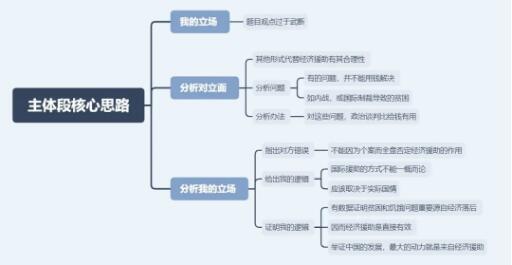Some people believe that rich countries should provide poorer countries with other types of help rather than financial aid. To what extent do you agree or disagree?
题目来源:2020年8月1日大陆雅思大作文
题目大意
有观点称富国应该为穷国提供非经济援助。同意反对?
写作思路解析
➡️一般同意反对类的题目,都是一个比较武断的结论,选择反对的立场比较合
➡️这道题目是一个没有给出具体前提的结论,所以采取反驳的立场——题目的错误就是在前提没有交代清楚——哪一种形式的援助更好,不是一个非此即彼的简单问题,必须结合各国国情而定;
➡️反驳的结构:主体段-1:站在出题者的角度,分析对方为何会这样想;主体段-2:针对对方的理论漏洞予以反驳,再给出我的理论,并予以证明。
提纲梳理见下
写作示范
There is an assumption that developed countries should provide their impoverished equivalents with alternative aid instead of economic assistance. However, I would say it is a generalized statement that ignores the discrete need of individual countries.
It is not difficult to understand why non-financial support is more recommended for international charity. It is true that many conundrums in less well-off countries cannot be addressed by money, such as the civil wars in some African countries and the poverty in North Korea caused by UN sanctions. For such problems, alternative options such as political negotiation seem to be more a fundamental solution.
The problem with the aforementioned reasoning, from my perspective, is that it would be oversimplified to deny the value of monetary charity based on particular circumstances. It doesn’t make sense to venerate either charity scheme over the other without taking into account the discrete need of the recipient countries. Researches show that the most frequently mentioned causation behind poverty and hunger is the backward economy. In this respect, it is difficult for me to see any solutions more pragmatic and effective than financial assistance, whether the money be used for public welfare or invested in industries to generate new job opportunities. One convincing example is the prosperity in China for the past decades, with the very catalyst behind the boom being the international fund from the global community.
It is my conclusion therefore, the means of global charity is not a black and white issue – it is simplistic to prioritize any modes over the other without scrutinizing the specific condition of the recipient country.


